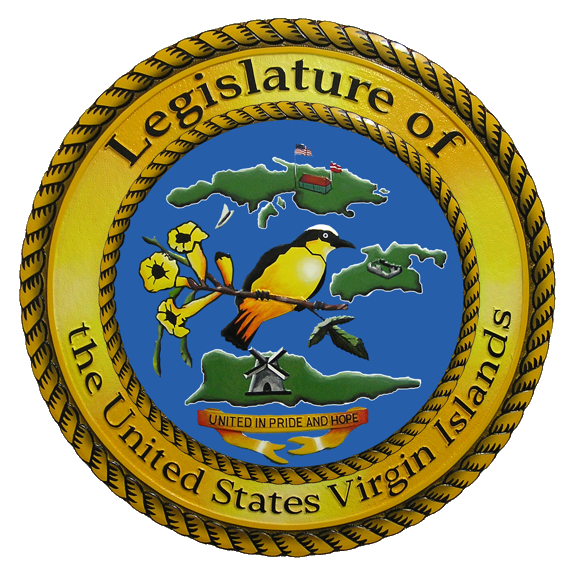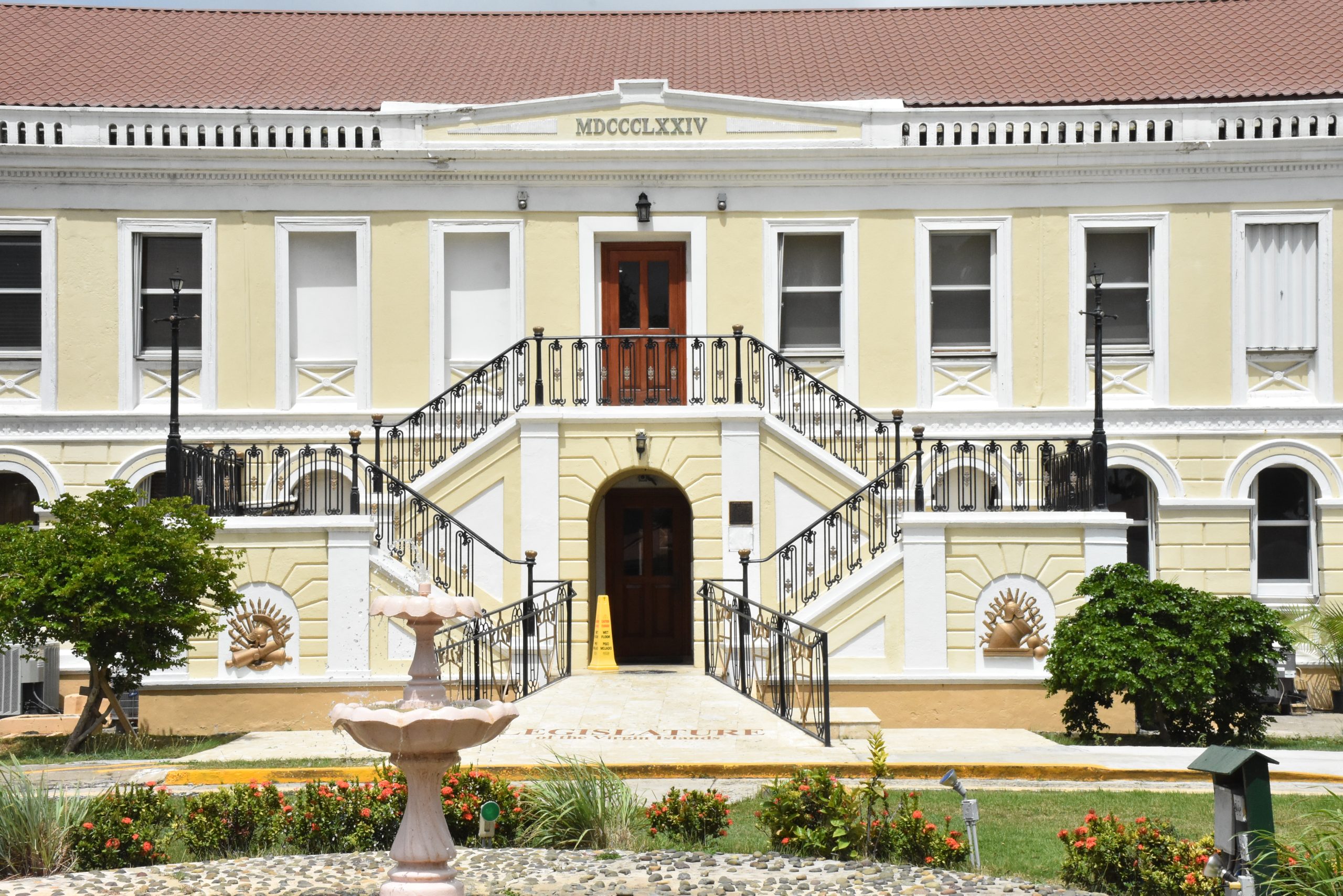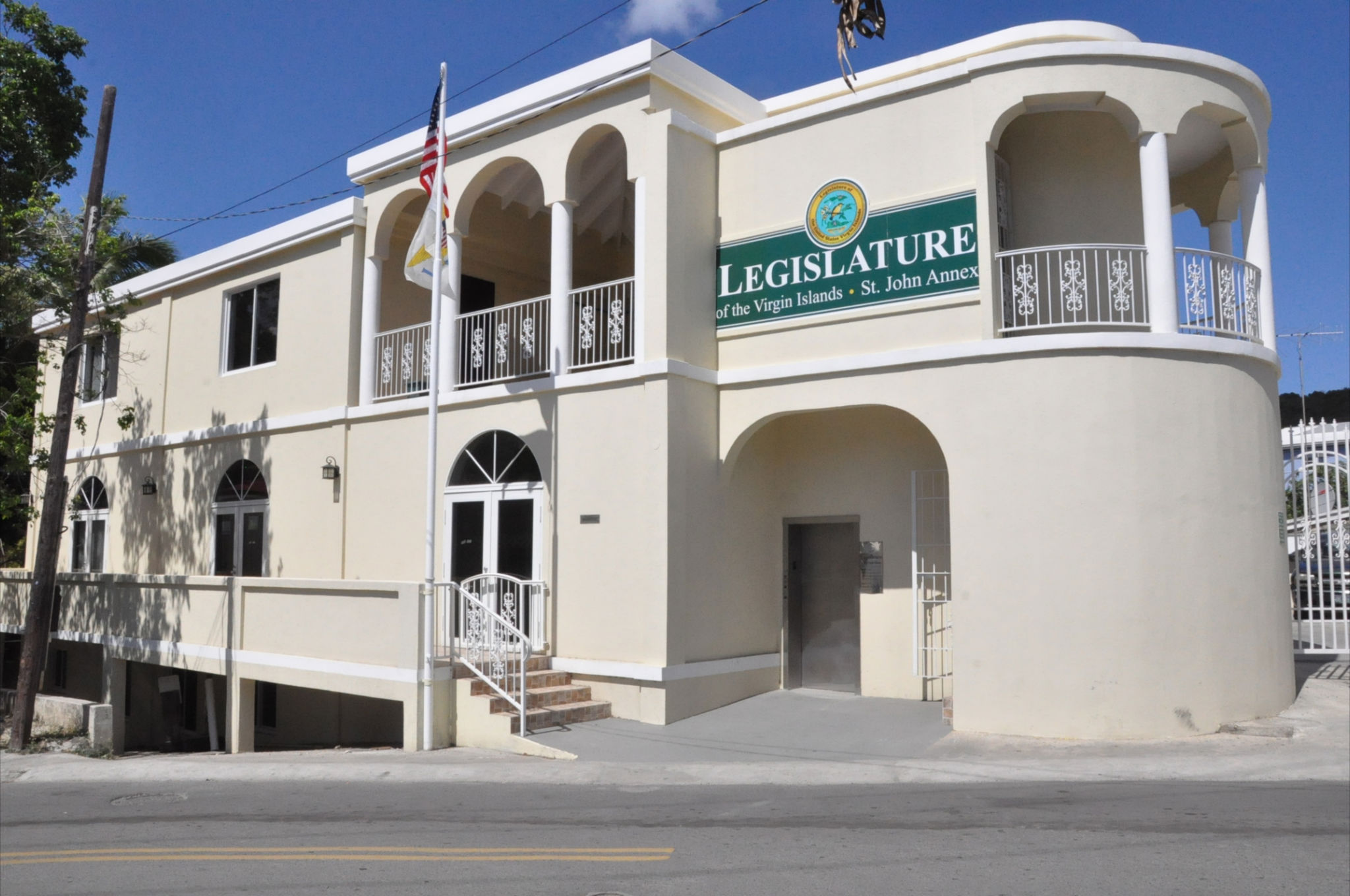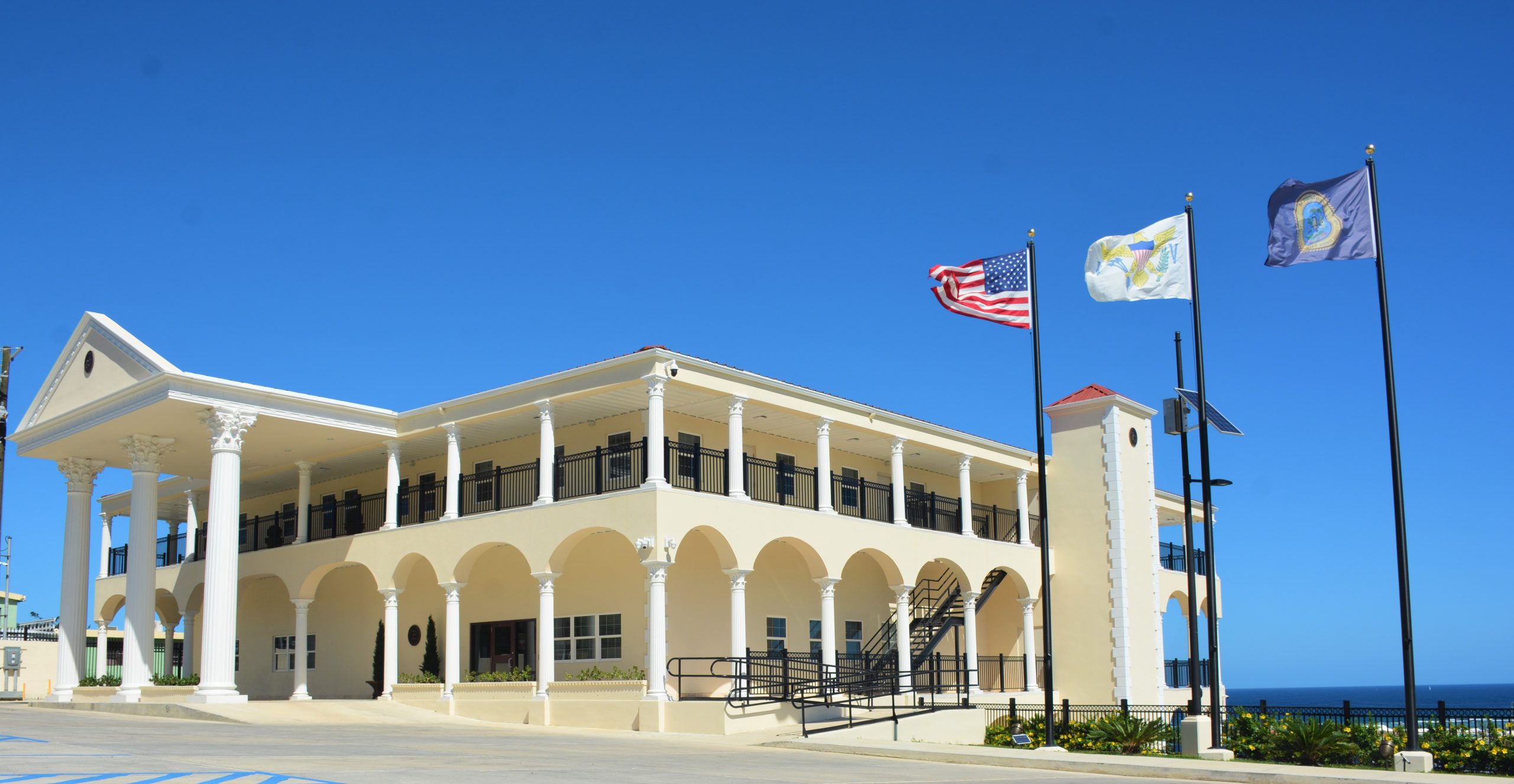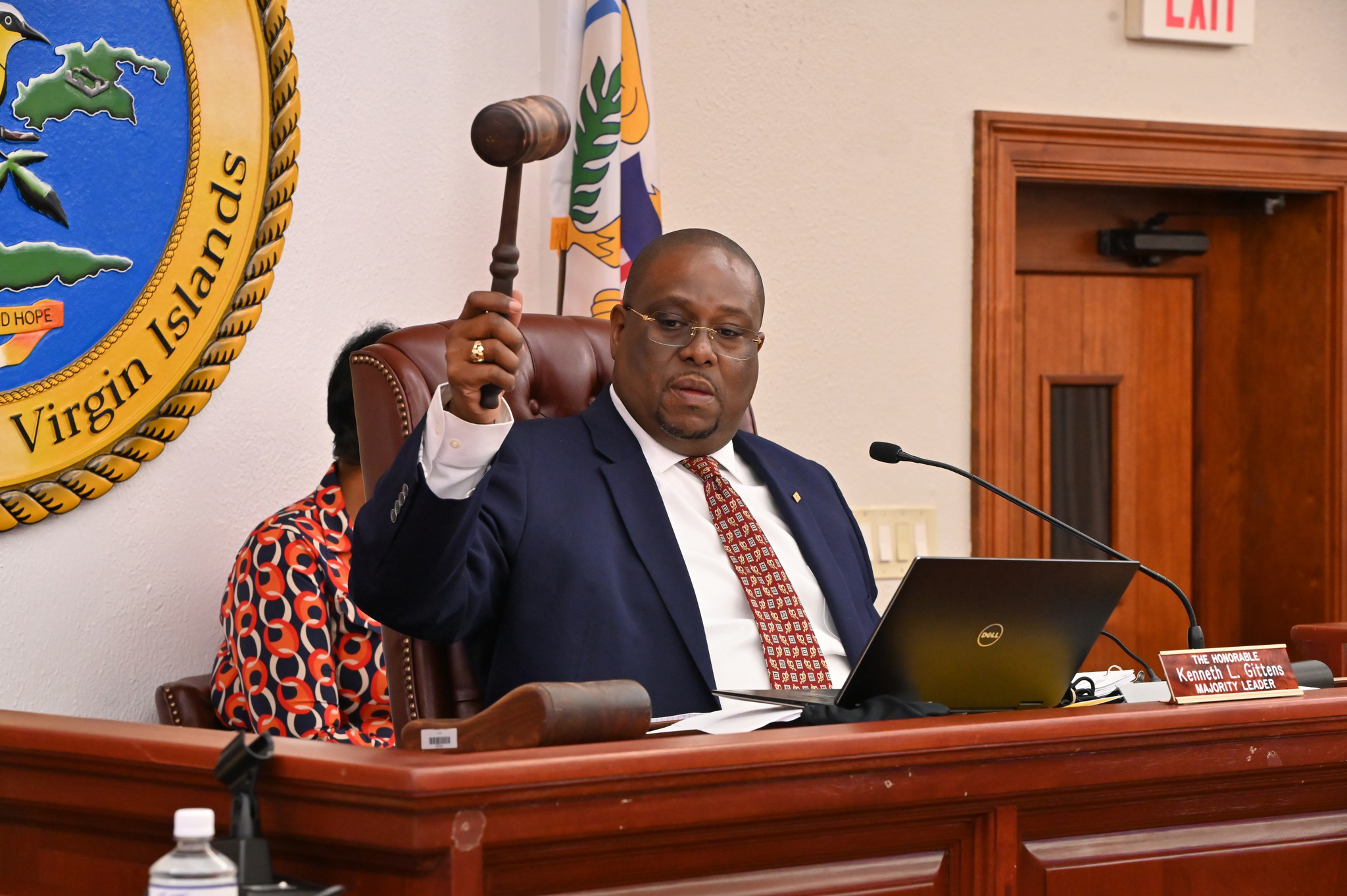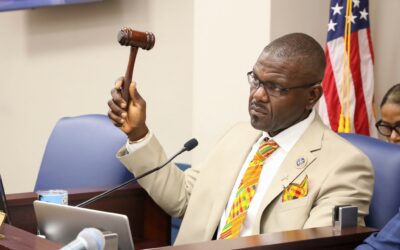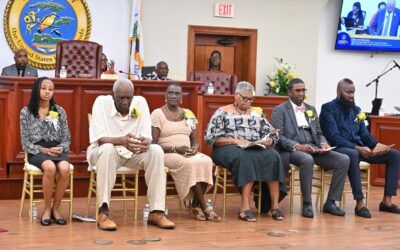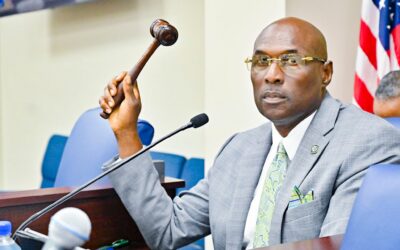ST. THOMAS – Members of the Committee on Homeland Security, Justice, and Public Safety, chaired by Senator Kenneth L. Gittens, convened in a meeting at the Earle B. Ottley Legislative Hall.
In Block 1, the Committee received overview testimony from the Office of the Territorial Public defender regarding, yet not limited to, updates on the Office’s operations, capital projects, and initiatives.
Samuel Joseph, Esq., the Chief Public Defender from the Office of the Public Defender delivered testimony. The Office of the Public Defender was established in 1973 under Title 5, Chapter 302, Section 3520 of the Virgin Islands Code for the purpose of representing appointed indigent criminal defendants that appear before the Superior Court of the Virgin Islands, and now the Virgin Islands Supreme Court. It is a semi-autonomous agency governed by the Public Defender Administration Board. The board is authorized to hire and terminate all personnel of the Office upon the recommendation of the Chief Public Defender.
The office is comprised of two district offices, one located in St. Croix, and the other in St. Thomas. The Office has twelve attorneys. The St. Croix District Office has four trial attorneys, The St. Croix District Office has four trial attorneys, one juvenile attorney, one paralegal, one investigator, one administrator, one fiscal officer, one director of information technology, three legal secretaries, one messenger/ receptionist, and one custodian. The St. Thomas/St. John District Office has four trial attorneys, one juvenile attorney, one paralegal, one investigator, one appellate attorney and one appellate legal secretary that serves both districts, one assistant administrator, three legal secretaries, one receptionist, one messenger, and one custodian.
The office serves in a territorial capacity, overseeing both district offices and is also admitted to the Virgin Islands Bar. All employees are unclassified and are members of the GERS. There are a total of thirty-two employees. Cases are divided into two categories, misdemeanors, and felonies. Misdemeanors are charges that carry a maximum of up to one year imprisonment, felonies involve charges that carry imprisonment over one year to incarceration for life. Felony cases make up the majority of matters assigned to the OTPD. As of February 28, 2023, there were 516 pending cases in the St. Croix District and 354 cases pending in the St. Thomas/St. John District. As of February 28, 2023, 48 new cases were appointed in the St. Croix District and 53 new cases in the St. Thomas-St. John District.
In Block 2, the committee considered Bill No. 35-0013, an act amending Title 20, Virgin Islands Code, Part 2, Chapter 35, relating to the issuance of operators’ licenses and identification cards to allow applicants to obtain limited local-purpose identification cards and operators’ licenses without providing certain federally required documentation. The measure was proposed by Senators Samuel Carrión and Angel L. Bolques, Jr., and cosponsored by Marvin A. Blyden.
Carol Thomas-Jacobs, Esq., the Acting Attorney General delivered testimony. According to Thomas-Jacobs, the REAL ID Act, introduced in 2005, created standards for federally approved state-issued drivers licenses and identification card, including requiring an applicant for a REAL ID driver’s license identification card provide evidence of lawful status in the United States. In addition to establishing minimum security standards for state issued drivers licenses and identification cards, the REAL ID law prohibits federal agencies from accepting for official purposes, such as accessing federal facilities, boarding federally regulated commercial aircraft, and entering nuclear power plants, and identifications cards from states that do not meet the standards set forth in the REAL ID act.
The act applies to all states and territories. The act, however, specifically allows states to issue limited purpose drivers licenses and identification cards that do not comply with the requirements of the REAL ID Act. Jurisdictions across the United States have the authority to issue their own requirements for local identification cards and purely local driver’s licenses that do not comply with the stringent legal presence requirement of the REAL ID. To date, nineteen states, Puerto Rico, and the District of Columbia have modified their laws regarding the requirements for obtaining these documents for purely local purposes. In 2013, California, Colorado, Connecticut, the District of Columbia, Nevada, Vermont, and Puerto Rico were the first jurisdictions to pass laws providing driver’s licenses or identification cards regardless of immigration status. Minnesota became the most recent state to enact similar legislation in March of 2023.
Leon LaFond, the Assistant Director of the Bureau of Motor Vehicles delivered testimony on behalf of Director Barbara Jackson-McIntosh. Per delivered testimony, she mentioned that she was given the chance to review the bill during its development phase and its final product. Director McIntosh also reviewed legislations of five out of nineteen states that offer driver’s licenses to immigrants regardless of legal status in the United States. The proposed bill would affect all residents regardless of immigration status. This bill would allow undocumented persons the opportunity to obtain a driver’s license so that they may drive legally. The bill would also protect the children of those of mixed status who are dependent on undocumented parents.
Glendina Matthew, the Interim Director of the Division of Banking, Insurance and Financial Regulation within the Office of the Lieutenant Governor, delivered testimony. Matthew stated that the division fully supported the bill. According to testimony delivered by Matthew, the bill could potentially improve public safety on roads and highways and ensure more drivers are covered by motor vehicle liability insurances. The bill would create a “Limited Purpose Virgin Islands Identification Card†thereinafter referred to as a “Limited Purpose Identification Card†and “Limited Purpose Operator’s License†that is not required to meet federal standards. It would delete the lawful presence requirement to obtain a Limited Purpose Identification Card or operator’s license. It would require proof of identity and proof of residency in the Virgin Islands for at least 90 days. It would also prohibit the disclosure of personal information or information in Bureau of Motor Vehicle records as to the type of operator’s license on file to any federal, state, or local law information agency without consent of applicant, signed warrant, court order or subpoena.
It would also restrict the usage of the Limited Purpose Identification Card and Limited Purpose Operator’s License to prove identity in an arrest, detention, and immigration enforcement action; it would restrict the usage of Limited Purpose Identification Card and Limited Purpose Operator’s License as a voter’s identification or for federal identification purposes; and would provide issuance of a license subject to a knowledge test. Matthew stated that as the regulatory body supervising insurance in the territory, unlicensed and uninsured drivers place an undue burden on innocent third-party drivers and the Government of the Virgin Islands when they are involved in an accident. According to Matthew, the community would be impacted because the Virgin Islands Compulsory Automobile Liability law does not extend motor vehicle liability insurance to unlicensed drivers. Matthew stated that the bill would positively impact the Virgin Islands by decreasing the number of unlicensed and uninsured undocumented drivers in the territory, improving road safety, and increasing revenue for the Government of the Virgin Islands.
Senator Dwane M. Degraff voiced concern over the proposed bill, voicing concern over language used in the proposed bill, and urged undocumented individuals to begin the process to become documented. Senator Alma Francis Heyliger voiced additional concerns about privacy, stating that because of the small size of the US Virgin Islands, the measure could potentially be used to specifically identify undocumented individuals. Senator Gittens stated that the proposed measure should not just be considered favorable for those who were undocumented, but also those who were documented and fell in limbo. The proposed measure was approved favorably and will be sent to the Committee on Rules and Judiciary for further consideration.
In block three, the Committee received an overview testimony for the Virgin Islands Police Department and the Office of Gun Violence Prevention not limited to, updates on the department’s operations, capital projects, and initiatives.
Antonio Emanuel, the Executive Director of the Office of Gun Violence Protection delivered testimony. According to Emanuel’s testimony, the mission of the Office is to help prevent gun violence and increase public safety by utilizing community-based outreach approaches. The approach is rooted in a public health approach to violence prevention. The Gun Violence Reduction Approach is separated into three sections, Violence Prevention, Violence Intervention, and Community Engagement. The Office of Gun Violence Prevention is not a law enforcement arm or organization. It does not investigate shootings, arrest suspects or confiscate weapons. It relies on local and federal law enforcement partners for criminal enforcement. The Office of Gun Violence Prevention consists of three main positions. These currently include the Executive Director and Community Engagement Specialist on St. Thomas and the Violence Interrupter on St. Croix.
Senators present at today’s committee meeting included Kenneth L. Gittens, Ray Fonseca, Marvin A. Blyden, Angel L. Bolques, Jr., Diane T. Capehart, Dwayne M. DeGraff, Novelle E. Francis, Jr., Alma Francis Heyliger, Donna A. Frett-Gregory, Javan E. James, Sr., Franklin D. Johnson, and Carla J. Joseph.
####
